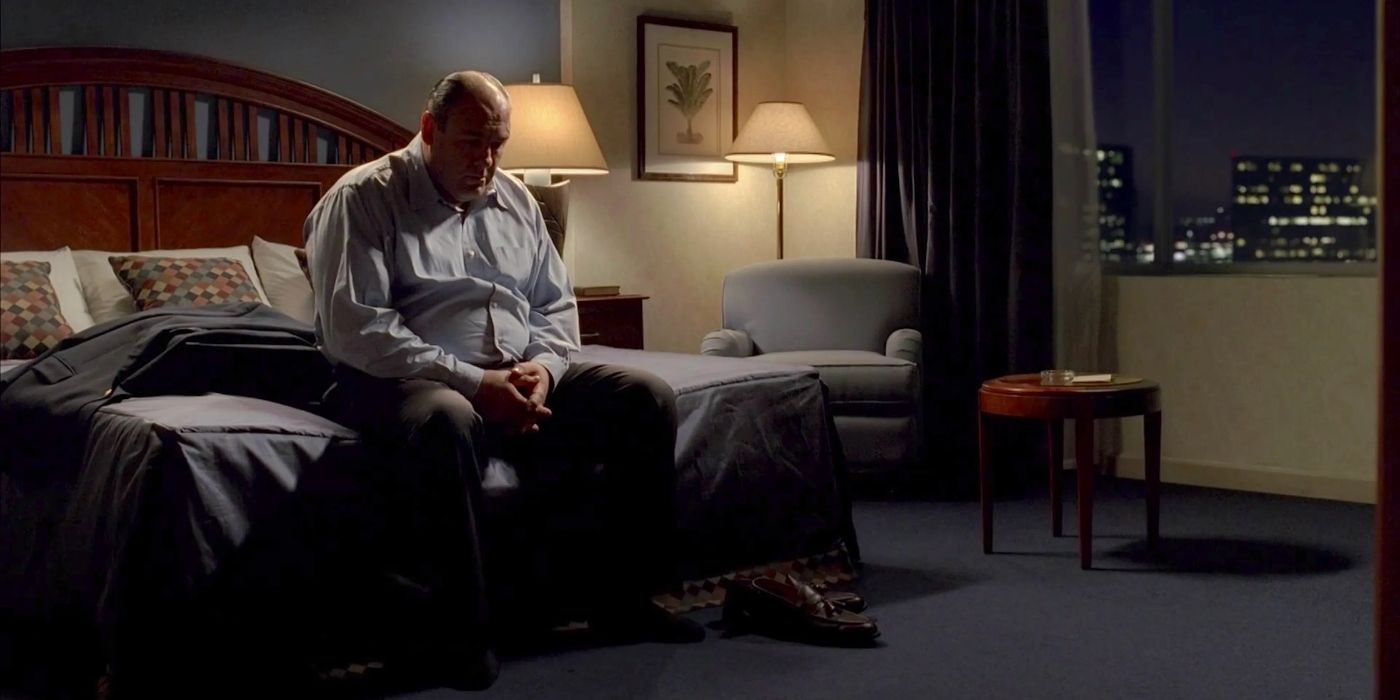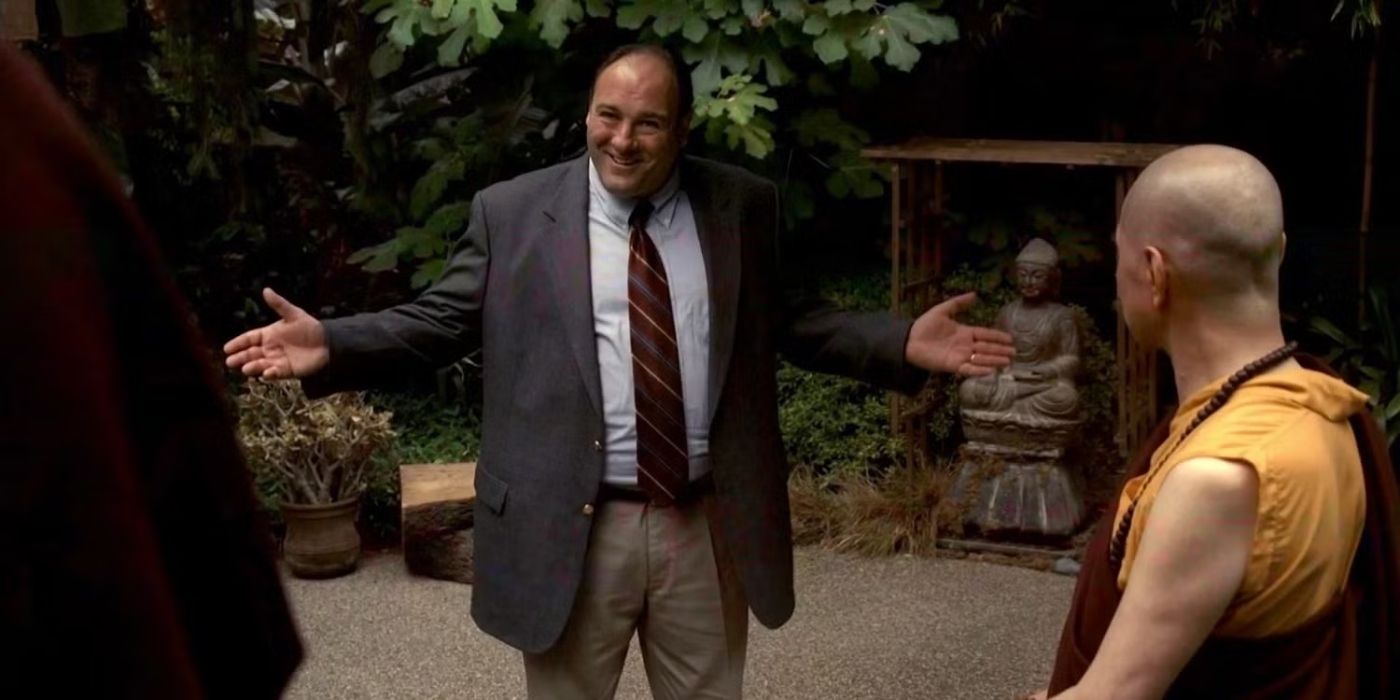
In the realm of television lore, very few characters have left an indelible mark on the collective consciousness like Tony Soprano, the mob boss central to HBO’s show “The Sopranos.” Portrayed masterfully by the late James Gandolfini, Tony dominates nearly every scene throughout the series’ 86 episodes. Even when off-screen, his presence is palpable. As the commanding figure at the heart of an extensive crime drama, it’s challenging to single out a favorite episode for Tony, but that’s exactly what series creator David Chase did, and his choice is unexpected.
In an interview with Huffington Post in 2017 to celebrate the Blu-ray release of the series, Chase was asked to select his favorite episode for each main character. For the pivotal character Tony, he chose not just one but two: “Join the Club” from Season 6 and “Mayhem”. Interestingly, these episodes don’t primarily focus on Tony in a traditional way.
What Happens in ‘The Sopranos’ Season 6?

In the early episodes of Season 6, “The Sopranos” often blurred the lines between reality and fiction by experimenting with its narrative structure. Towards the end of the season opener titled “Members Only,” Tony pays a visit to his Uncle Junior (played by Dominic Chianese), who has been showing signs of dementia throughout the series. In a tragic twist, believing him to be an old adversary, a bewildered Junior shoots Tony in the abdomen. On the brink of collapse, Tony manages to dial 911 before succumbing to unconsciousness.
Following the incident, Tony finds himself in a critical condition, lying in the hospital in an induced coma as medical professionals work tirelessly to prevent infection that threatens his life. In this moment of uncertainty, Carmela (Edie Falco), Tony’s children, and fellow mob associates rally around him, offering their support and sending positive vibes. At the same time, Tony embarks on a unique journey, distinct from everyone else.
In a coma, Tony dreams of an alternate version of his life, where instead of being a mobster, he thrives as a precision optics salesman with a prosperous career. At a conference in California, his briefcase gets mixed up with one belonging to Kevin Finnerty, a man who bears a striking resemblance to Tony. Since he lacks the ID to enter the conference, Tony sets out to find Finnerty. As he spends more time living as another person, he starts to doubt his own identity.
The decision to have Tony Soprano speak more clearly and with less of a thick Jersey accent in the final season of the series is an unusual storytelling choice, especially at the start. This change in speech is reminiscent of Gandolfini’s natural way of speaking, which contrasts sharply with the character’s voice we’d heard for five seasons. Some viewers found this confusing when they first watched it, but as the series approaches its conclusion, these episodes delve deeply into some of its most significant themes.
The Larger Forces of ‘The Sopranos’

Among the powerful quotes in Season 6, one that resonates deeply isn’t spoken by any character, but rather is a Native American Ojibwe saying hanging on the wall in Tony’s hospital room: “Sometimes I feel sorry for myself, and all the while, a strong wind is carrying me across the sky.” This seemingly unrelated quote serves as an unexpected yet fitting theme for the final season, as the series delves into the consequences of the characters’ decisions and their struggle against forces greater than themselves that these choices often collide with.
At the beginning of the series, Tony notoriously stated that there are only two possible outcomes for men like him in the mob world: either dead or imprisoned. Tony and his fellow gang members often adopt a fatalistic perspective, implying that their choices have minimal impact on their ultimate fate because the end result is largely predestined. As a young man, Tony perceived himself as having limited alternatives other than joining a life of crime, feeling that he was merely following a path that had been set out for him since childhood.
In Tony’s dreamlike state, an alternate life is shown to him, one where he steered clear of the mafia. It’s debatable whether the Tony we’ve come to know from the series would have found genuine contentment in any other line of work. This alternate Tony appears to have thrived in his profession, yet there was a persistent longing that drove him to assume another person’s identity.
In “The Sopranos,” it’s evident that characters like Tony are shaped by their upbringing and personal choices, blurring the line between nature and nurture. His involvement in crime was influenced by his father and the disdain he felt from his mother, yet he personally chose the path that led him to that hospital room. This aligns with the show’s profound Catholic perspective, suggesting that the afterlife, be it Heaven or Hell, is decided by the choices individuals make during their lives.
Among numerous outstanding episodes, Chase selected one that resonates logically as Tony’s finest moment. While these episodes, like “Join the Club” and “Mayham,” may not spotlight the Tony viewers are accustomed to, they delve into the aspects that shape him as a character – inherent traits or those molded by his decisions. It’s one of many instances demonstrating how The Sopranos revolutionized television storytelling for all time.
Read More
- PI PREDICTION. PI cryptocurrency
- WCT PREDICTION. WCT cryptocurrency
- This School Girl Street Fighter 6 Anime Could Be the Hottest New Series of the Year
- DOOM: The Dark Ages Debuts on Top of Weekly Retail UK Charts
- Solo Leveling Arise Tawata Kanae Guide
- Chainlink: Checking LINK’s 20% drop amid a 4x jump in fees
- Black State – An Exciting Hybrid of Metal Gear Solid and Death Stranding
- Marvel’s Spider-Man 2 PC Graphics Analysis – How Does It Stack Up Against the PS5 Version?
- The Elder Scrolls IV: Oblivion Remastered – How to Complete Canvas the Castle Quest
- ANKR PREDICTION. ANKR cryptocurrency
2025-05-25 02:03